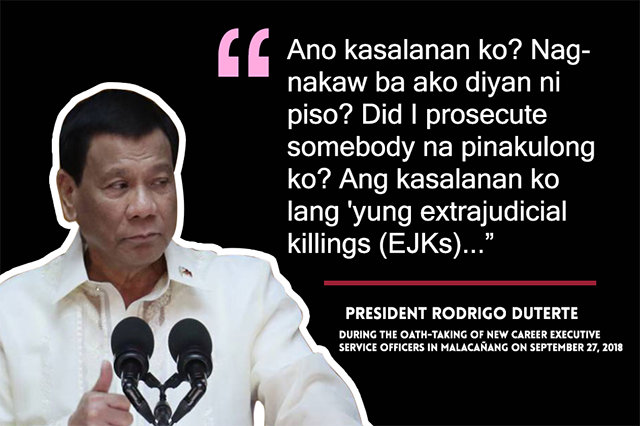Duterte’s EJK ‘Admission’: Media Yield to Palace Spin
PRESIDENT RODRIGO Duterte’s blasphemous, sexist, anti-poor tirades, including hate speech, have made enough headlines in the past to make such offensive outbursts almost a cliché.
During the oath-taking of new Career Executive Service Officers in Malacañang last September 27, he asked,“Ano kasalanan ko? Nagnakaw ba ako diyan ni piso? Did I prosecute somebody na pinakulong ko? Ang kasalanan ko lang ‘yung extrajudicial killings (EJKs).” (What is my sin? Did I steal even one peso? Did I prosecute somebody who I ordered jailed? My only sin is extrajudicial killings. (“Duterte says his only ‘sin’ is extrajudicial killings”)
Media compliantly reported the president’s statement, giving equal weight to both the government side as well as that of Duterte’s critics. Some reports, went as far as to cite the president’s aides who again blamed Duterte’s Visayan upbringing and ‘playful’ nature as an excuse, giving this reason undue credence. Clearly, there are enough Visayan politicians who disprove this defense.
Few accounts noted the gravity of the statement and its implications on the president’s possible culpability before the International Criminal Court (ICC).
CMFR monitored reports from the three national broadsheets Manila Bulletin, the Philippine Daily Inquirer and The Philippine Star; the primetime newscasts 24 Oras (GMA-7), Aksyon (TV5), News Night (CNN Philippines), TV Patrol (ABS-CBN 2), cable news channel ANC’s programs; and the online news sites Rappler and InterAksyon from September 27 to October 2, 2018.
The Spin Doctors
The administration went on damage control mode immediately after Duterte’s statement by telling the public not to take it at face value.
In a dzRH radio interview that aired last September 28, Presidential Spokesperson Harry Roque said the president was merely emphasizing that he is not corrupt. Roque added that the president’s words were not self-incriminating since he had taken no oath. (“Duterte just being ‘playful,’ not serious on ‘EJK his only sin’ statement”). The broadcast host let the shallow spin pass.
In a separate interview that aired on ANC’s Dateline on the same day, Presidential Legal Counsel Salvador Panelo said the president’s remarks were being misinterpreted because “he’s Visayan, he’s not a Manileño,” but offered no further explanation on why that should matter. (“Dateline: Duterte’s EJK sin remark only a ‘matter of language’: Panelo”). Again the interviewer did not question the silly reference to the president’s being a Bisaya.
Philippine National Police (PNP) chief Oscar Albaylde also chimed in to support the president. In a Camp Crame press briefing, Albaylde said it was a statement made out of frustration, adding that “Kasi wala nang maibato sa kanya, kung anu-anong issue, so parang ang sinabi na lang niya ‘O sige, inaamin ko na lang.’” (That’s because there’s nothing else that can be thrown at him so what he said was, “ok, I am just admitting it.”) The report did not say if anyone asked the police chief to make sense of what he just said. (“Duterte’s EJK admission just ‘out of frustration,’ says PNP”)
‘Admission against interest’
While his cohorts argued that the president was simply being “playful,” others took it much less lightly. Some legal experts saw this as an “admission against interest,” and therefore admissible in court. These reactions or comments were reported with little interpretation or assessment of the gravity of what the president was admitting. In reducing the coverage to mere recording of statements, journalists showed little capacity to appreciate the significance of the president’s telltale remark.
The following reports took note of the seriousness of the issue involved:
The National Union of People’s Lawyers (NUPL) said it will file a supplemental pleading before the International Criminal Court (ICC) following the president’s statement. Atty. Jude Sabio, who filed one of the complaints before the ICC against the president, said the ICC can use his “admission” in prosecuting him for crimes against humanity. (“Group to use Duterte’s EJK admission in ICC case,” “Lawyers claim Duterte’s ‘admission’ on extrajudicial killings is evidence”)
Antonio “Tony” La Viña, former dean of the Ateneo School of Government, said the president’s statement could make him liable for culpable violation of the constitution, for which offense he can be impeached. (“Duterte’s ‘EJK sin’ remark can be ground for impeachment, law experts says”)
The Commission on Human Rights, Human Rights Watch and Amnesty International denounced the president’s statement. UN Special Rapporteur Agnes Callamard, a critic of the president’s anti-drug campaign tweeted, “My ‘only’ sin is EJK. Translation: my only sin is imposing unthinkable sufferings on thousands of vulnerable families, emboldening corrupt policing, destroying rule of law.”(“Rights groups slam Duterte over EJK ‘sin’ remark,” “Unable to look into EJKs herself, Callmard speaks out on Twitter”)
Administration apologists have often declared that the president’s more outrageous statements should not be taken seriously, but the reality is that as head of state, whatever he says publicly has the weight of his office behind it. Three years in office, Duterte should at least be forced to recognize the obligation inherent in his high office.
Amid the apparent confusion of claims and counter-claims, the media failed to note this, and by reporting the continuing suggestion to ignore the president’s offensive statements, in effect yielded to the palace spin on the issue. Their reports were limited to presenting the opposing arguments for the sake of balance and fairness, but beyond that should have made it clear that in the context of the many extrajudicial killings that have indeed happened during the two years of the Duterte watch, his “admission” was of momentous significance.

Leave a Reply